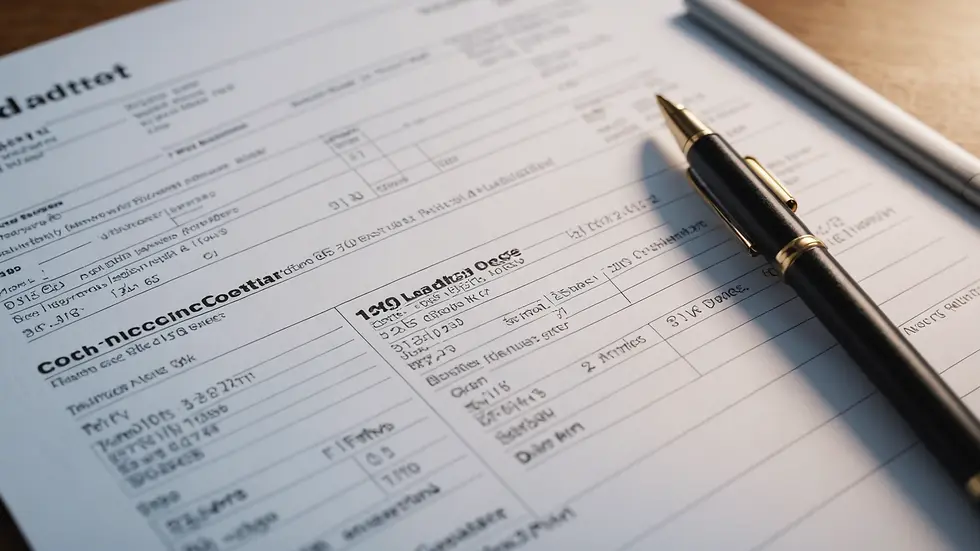10 Key Reasons Why Independent Contractors Must Separate Business and Personal Accounts
- Allison O'Dell
- Jan 16, 2025
- 4 min read
For independent contractors, the thrill of being your own boss can be incredibly rewarding. Yet, it also comes with responsibilities, especially in managing finances. One vital step many contractors overlook is separating business and personal accounts. Although it may seem inconvenient, the advantages are substantial. Here are ten compelling reasons why it's crucial for independent contractors to maintain distinct financial accounts.
1. Simplifies Bookkeeping
Keeping your business and personal accounts separate simplifies your bookkeeping process immensely. For example, if you have a business account, you can quickly compile expenses related to your work, making tax preparation much more manageable. According to a survey, about 40% of small business owners find bookkeeping the most overwhelming part of running their business. With distinct accounts, you can expedite this process, saving up to 10 hours during tax season.

2. Clearer Financial Overview
When your business finances are separate from personal accounts, you get a clearer view of your financial health. This separation allows you to assess your contracting work's profitability more accurately. For example, if your business account shows a monthly revenue of $5,000 and expenses of $3,500, you can easily identify your actual earnings without personal expenses muddying the waters.
3. Easier Tax Preparation
Independent contractors must file taxes using Form 1040 Schedule C, which requires detailed reporting of income and expenses. Having separate accounts makes this task easier. For instance, if you maintain a dedicated business account, you can access necessary financial records quickly, reducing the chances of missing deductions. Studies show that contractors who meticulously track their expenses can deduct up to 30% more on average compared to those who don’t.

4. Improved Professionalism
A dedicated business account not only helps in managing finances but also enhances your professionalism. Receiving payments into a business account creates a trustworthy image for clients. For example, a 2022 survey indicated that 65% of clients prefer to work with contractors who have professional banking arrangements. This impression can lead to more referrals and repeat business.
5. Simplified Financial Planning
Separate accounts facilitate budgeting for both personal and business needs. When you see the income and expenses related to your work clearly, making informed financial decisions becomes simpler. For instance, if you notice that your business expenses average $1,200 monthly, you can adjust your budget accordingly to maintain healthy cash flow.
6. Legal Protection
If your business ever faces legal issues or disputes, keeping finances separate can offer an added layer of protection. Demonstrating that your personal and business funds are distinct can help in safeguarding your personal assets. This separation can be crucial if you encounter a debt collection situation or face a lawsuit, as it shows that the business is a separate entity.
7. Better Cash Flow Management
With separate accounts, monitoring your business cash flow becomes easier. You gain insights into when income peaks and where expenses fall. For instance, if your business account shows a steady income of $8,000 in the busy season and drops to $3,000 in slower months, you can plan ahead for leaner times. This knowledge can lead to better financial decisions, like adjusting your service prices based on seasonal fluctuations.
8. Easier Software Integration
Most accounting software solutions work best with dedicated business accounts. If you opt for automated bookkeeping, separate accounts make it smoother to integrate your financial data. For example, using software like QuickBooks can save you up to 20 hours of manual entry by automatically pulling data from your business account.
9. Enhanced Ability to Secure Financing
As an independent contractor, you might consider seeking financing down the road. Lenders prefer organized, clear financial statements when assessing risk. By showing that you maintain separate accounts, you enhance the likelihood of securing loans or credit lines. Research indicates that businesses with organized financials are 50% more likely to receive favorable lending terms.
10. Improved Stress Management
Finally, separating your accounts can significantly reduce financial stress. Managing mixed finances can lead to anxiety and confusion. By keeping everything distinct, you can confidently allocate your finances and concentrate on your work without worrying about potential errors. Studies have shown that clear financial organization can lead to a 30% reduction in stress levels among small business owners.
Each of these ten reasons highlights the importance of keeping business and personal finances separate. While it may require a bit of initial effort to set up distinct accounts, the long-term benefits are considerable. By adopting this practice, independent contractors can lay a solid foundation for financial clarity and control.
Your Next Steps Toward Financial Clarity
As an independent contractor, every big decision contributes to your path. Separating your business and personal accounts is a key move that simplifies your financial management and supports your growth. With clearer bookkeeping, a professional image, and enhanced legal protection, your freelance business has the potential to flourish. Start today by setting up a separate business account—you'll find that it pays off in the long run.
Now, focus on your craft and let your financial operations run smoothly!




Comments